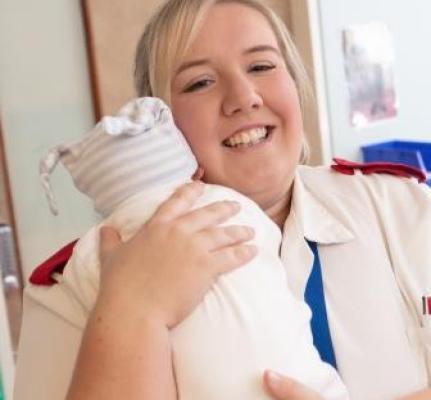Maternity support worker
Maternity support workers are the frontline of a family's journey through pregnancy, childbirth and the first few days of birth.
Working life
As a maternity support worker, you'll work under the supervision of a registered midwife. They are sometimes also known as maternity healthcare support workers or midwifery assistants.
You'll be:
- helping to care for mothers and babies
- making routine observations (temperature, pulse, blood pressure, breathing, etc)
- updating records and other admin tasks
- educating parents one-to-one or in groups
- taking blood samples for testing
- ordering stationery and equipment
- preparing equipment
- promoting breastfeeding
- reporting problems to a registered midwife or nurse
They work in:
- the community
- post-natal wards
- maternity theatres
- delivery suites
- midwifery led units
You need to be able to cope with emergency situations and straightforward labour and birth.
Real-life story - Katie Battersby
Maternity support worker
Read Katie's storyI absolutely love carrying out patient care, helping and supporting women and their families with their new born babies.

Entry requirements
Entry requirements vary between employers but they all expect a good standard of numeracy and literacy.
Employers may ask for up to five GCSEs or equivalent and some may also ask for a qualification in health and social care such as an NVQ.
They may also ask for experience of working with children and families which may be accepted in place of formal qualifications.
And if you're applying for a role in the NHS, you'll be asked to show how you think the NHS values apply in your everyday work.
Skills and personal characteristics needed
You'll need to be:
- caring and patient
- able to work with people from all walks of life
- accepting of other peoples lifestyles
- physically fit
- flexible and adaptable to deal with unpredictable situations
- able to follow instructions and procedures
- willing to be present at childbirth
- able to work under pressure
- able to deal with other people’s emotions
You'll also need:
- excellent communication skills
- organisational skills
Training and development
You'll get the training you need to do the job. This includes an introduction to the department, how to use the equipment and the procedures to follow. You'll also be expected to complete the Care Certificate if you haven't already done so.
You may be offered the chance to study for qualifications such as:
- the NCFE CACHE level 2 Certificate in Healthcare Support Services
- the NCFE CACHE level 3 Diploma in Healthcare Support
- an apprenticeship as a healthcare support worker
You could join the Royal College of Midwives (RCM). The RCM runs courses, conferences and seminars where you can update your skills and network with others working in the same field.
With experience you could become a senior support worker (usually at Band 3 of Agenda for Change). You could apply for other jobs in the wider healthcare team or you could apply to train as an assistant practitioner, nursing associate, midwife or nurse.
Pay and benefits
Your standard working week will be around 37.5 hours and may include a mix of shifts, such as nights, early starts, evenings and weekends. As a maternity support worker, you’ll be paid on the Agenda for Change (AFC) pay system, typically starting on band 2.
You’ll also have access to our generous pension scheme and health service discounts, as well as 27 days of annual leave, plus bank holidays, which increases the longer you’re in service.




